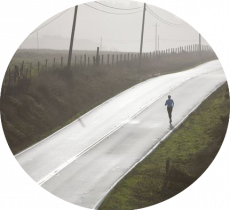The Discipline is the Goal

Brian Stevenson / Getty Images
For most of my life, I’ve found comfort and catharsis in running. The relentlessness of the pace and its imperative to persist (almost) always help quiet my busy brain.
Like many dedicated runners, I’d always assumed that, sooner or later, I’d run a marathon. For years, I waited for inspiration to strike. When it did—usually while clicking through finish-line pics of exhausted-but-elated marathoners—I expected motivation to follow. But the sustained urge never arrived.
Over time, I upped my mileage, hoping that, eventually, I’d need to, I’d just have to run a marathon. But many miles were logged, and still I failed to feel the urgency commensurate with the goal. It wasn’t until these last months of Covid-provoked upheaval and change passed that I remembered that I can change, too.
Among other experiments, I decided to try a training plan. Which I hated. Change is hard, and new learning curves are often very sharp. The plan insisted on showing me, with spreadsheet severity, that what seemed possible in the abstract was impossible in practice: I couldn’t hit my paces; my watch was constantly disappointed in my efforts; and marathon mileage felt totally out of reach.
I decided I wasn’t going to run a marathon after all—clearly, I wouldn’t be able to, anyway. Instead, I’d just have to work on disciplining myself to the plan, and that would have to be enough.
Surprisingly? It was.
Many weeks have now passed, and I’ve made that imperfect plan a part of my every day. This is not to say that I hit my paces (I don’t) or that my watch is happy with me (never). But marathon mileage is in reach, and its proximity has given me the motivation, the drive (if not necessarily the need) I passively sought in the past.
What lessons have I drawn from this experience? A few, but among the most meaningfully applicable: The discipline is the goal.
When a goal is too big, or too diffuse, or maybe even too quiet to command attention, a plan to start and a commitment to continue can bring it into view and therefore in reach. I didn’t have to need to or have to run a marathon. I could simply want to, and start from there.
Chuck Close famously observed that “inspiration is for amateurs—the rest of us just show up and get to work.” That’s one way to describe it. But here I think Rilke offers a more philosophical sourcebook: You don’t yet know the answers. That’s okay—you don’t have to. You inhabit your answers by first living your questions.
